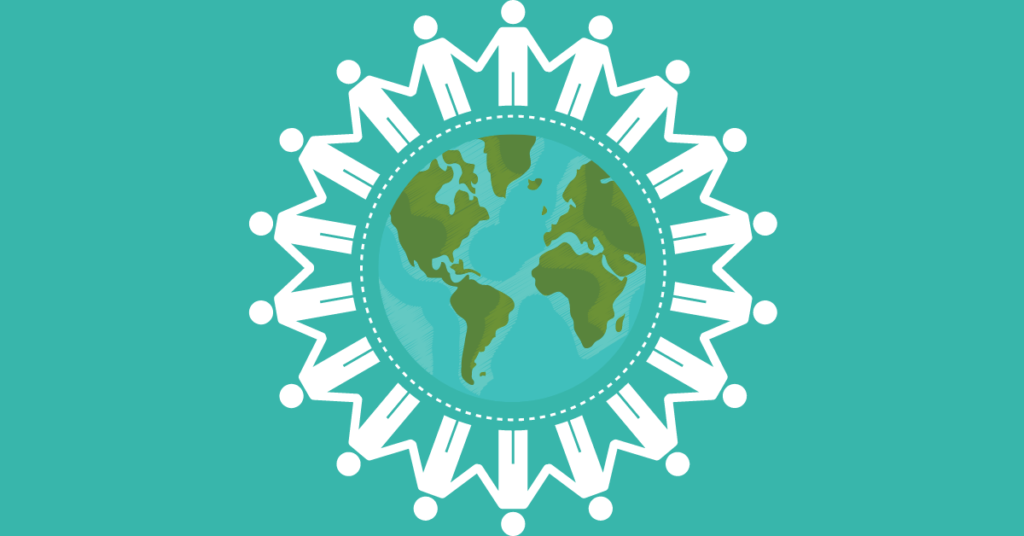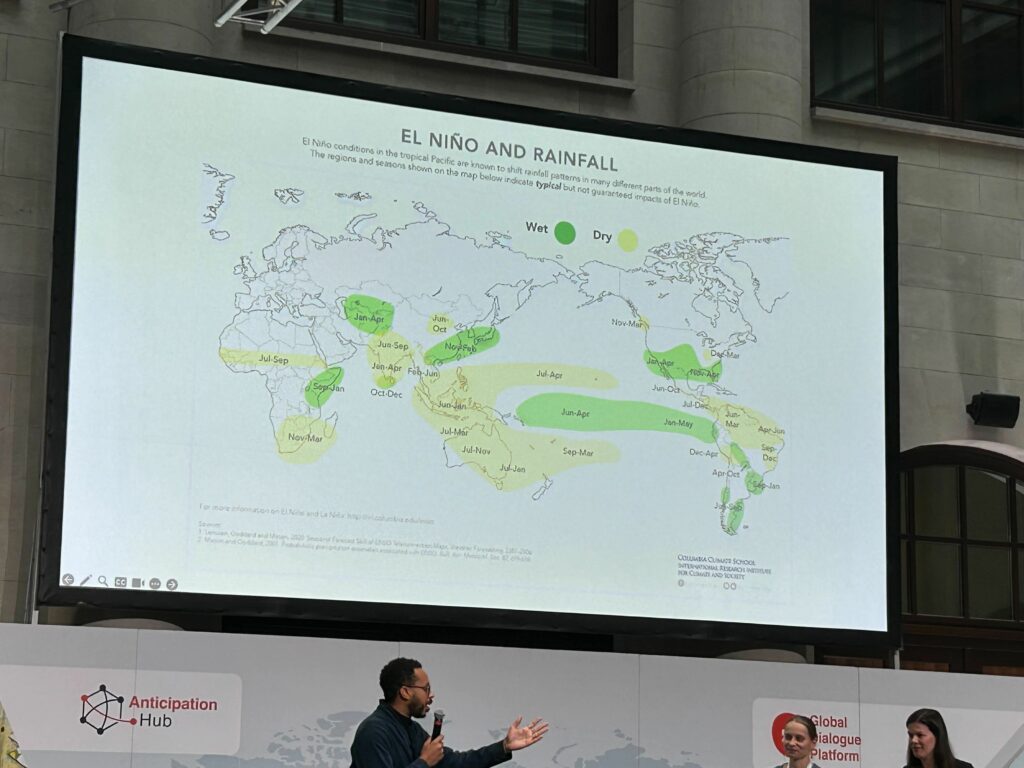
Welcome to the first post in a new blog series on anticipatory action. The series will explore MapAction’s work to strengthen readiness and preparedness worldwide. We’ll kick off with a few facts and definitions, as well as a review of some of the key sessions and agenda points from the The Anticipation Hub: The 11th Global Dialogue Platform on Anticipatory Action, which is currently underway in Germany’s capital Berlin. This blog is part of an anticipatory action programme by MapAction kindly supported by the German Federal Foreign Office and the Insurance Development Forum.
What does this blog cover?
- Summaries, notes, images, cartoons and observations from the The 11th Global Dialogue Platform on Anticipatory Action
- Anticipatory action: definition, components, facts and overview
- Examples of MapAction’s work in anticipatory action
The 11th Global Dialogue Platform on Anticipatory Action is currently live from Berlin! Register here to watch it. Listen in as disaster management experts from across the world discuss the latest vanguard thinking on how to mitigate climate change and weather-related hazards.
October 12th. 09:10 UTC
📣 Join us for the last day of #GlobalDP. At 1.45PM (CEST) we'll hear from @WFP and our Somalia Hub @SomaliNexus and @SoDMA_Somalia representatives who'll discuss how can we better collaborate on #AnticipatoryAction in differing contexts. Register here: https://t.co/I4JbWoSOcM pic.twitter.com/lMIJJwHluA
— Start Network (@StartNetwork) October 12, 2023
Delegates share their learnings while taking hits at a piñata!

Thank you to all of our co-organizers for making the 11th #GlobalDP happen!@IFRC@RCC@roteskreuz_de @StartNetwork @FAO@WFP@UNOCHA
We couldn't do it without you!
1/2 pic.twitter.com/YGPWzdgZCf
— Anticipation Hub (@AnticipationHub) October 12, 2023
October 12th. 07:50 UTC
Guten Morgen. Here are some highlights to look forward to today, the final day of the The 11th Global Dialogue Platform on Anticipatory Action taking place in Berlin.
We are up and running on our final day of #GlobalDP – come and join us for our opening plenary
A selection of images from day two are below 🖼️ pic.twitter.com/BrC6X2GyUz
— Anticipation Hub (@AnticipationHub) October 12, 2023
Join us for an insightful discussion on ‘Preparing for Climate Extremes: Lessons on Adaptation from South Asia’, October 12 2023, 03:30 PM IST Register here: https://t.co/KEM4691YQW@IDS_UK@Anticipate_CC@iitdelhi@NITDurgapur@icccad#SouthAsiaResilienceHub2023@copreshub pic.twitter.com/eoznIkNFoP
— AIDMI (@AIDMI_ORG) October 11, 2023
Final day of the 11th #GlobalDP | In one of the sessions, ACAPS specialists Diogo Lemos, Francesca Giovinazzo, and Nic Parham will explore how joint analysis sets the stage for effective preparedness measures and more fit-for-purpose and impactful anticipatory action.
Details👇 https://t.co/HefrkSqAeT pic.twitter.com/g0Xddm9Yo0
— ACAPS (@ACAPSproject) October 12, 2023
October 12th. 07:30 UTC
The Berlin Festival of Lights, which sees important landmarks in the German capital illuminated in technicolour, is also underway in Germany’s capital.


October 11th. 15:05 UTC
Heading into the final Day Two sessions now. With that, we’ll be wrapping up our Anticipation Hub blog today. We will add brief summaries and the odd pic tomorrow.
We’ll leave you with the excellent selection of anticipatory action cartoons to wind down with. Bis Morgen!
October 11th. 13:25 UTC
The Data Guardian Game for anticipatory action: a workshop on availability of data in anticipatory action.
“A useful tool to help participants grasp the significance of data in the decision-making process.”
Luke Caley from IFRC outlines the organisation’s database “with 100 years of disasters to learn from”.
“Global data needs to be verified on the ground”. Now the game begins.
Participants are divided into four groups, assuming the roles of government decision-makers. Each group is tasked with investing in various governmental agencies to enhance their data collection and analysis capabilities.
In the second stage of the game, a flood scenario is introduced, prompting participants to gather information exclusively from the agencies in which they had initially invested; they are only permitted to access data and information from these specific agencies. Armed with this information, the groups then proceeded to make crucial judgments regarding the activation of an early action protocol.
MapAction and anticipatory action
MapAction’s work in anticipatory action is kindly supported by the German Federal Foreign Office and the Insurance Development Forum, as well as other individual and institutional donors. Our work in anticipatory action takes on different shapes and forms from territory to territory and is correlated to disaster risk reduction initiatives worldwide. The list below is non-exhaustive and is designed to give a brief overview of MapAction anticipatory humanitarian action work.
In Kenya we work with Oxfam and the Arid and Semi-Arid Land (ASAL) Humanitarian Network to forecast and map the potential impacts of drought on northern counties. “The Arid and Semi-Arid Lands (ASAL), in Kenya cover close to 80% of the land and are home to approximately 36% of the country’s population, 70% of the national livestock and 90% of the wildlife,” states ASAL’s website. “The residents of the ASALs earn their living through a mix of pastoralism and agriculture. However, pastoralism is the main source of livelihood contributing to 13% to the GDP of Kenya and further plays a vital role in both the economic and socio-cultural development of the resident communities.” Recent droughts over the last five years have left CSOs and the communities they work with in the northern Kenyan counties of Isiolo, Kwale, Marsabit, Nyeri, Kitui and Taita Taveta more vulnerable. MapAction’s aim with this work is to increase the visibility of the work CSOs are doing in humanitarian action and to help them leverage their forecasts to release early funding and create resilience against future hazards for local residents. MapAction’s support focused on mapping at county and even ward-level, a more localised administrative unit, ensuring CSOs can integrate GIS and IM into their disaster management tools .
Start Network is another key partner for MapAction. In the last few months alone, MapAction volunteers have delivered resilience-building seminars and events for local disaster managers in Nepal, Bangladesh, the Philippines, Senegal and Madagascar.
READ ALSO: MapAction continues to strengthen global disaster preparedness in summer of 2023
Some of the most important work MapAction does under the umbrella of anticipatory action is through the INFORM network, the “multi-stakeholder forum for developing shared, quantitative analysis relevant to humanitarian crises and disasters.” MapAction works with several national and subnational disaster management agencies worldwide through this framework, including ongoing projects to build or upgrade national disaster models in Eswatini and Niger.
#MapAction staff and volunteers are attending a training event with INFORM in Italy this week. #INFORM is a multi-stakeholder forum for developing shared, quantitative #analysis relevant to humanitarian #crises and #disasters. #MapAction is a partner. #disasterpreparedness pic.twitter.com/aIdoDZ6VcX
— MapAction (@mapaction) September 21, 2023
October 11th. 13:10 UTC/15:10 CEST: MapAction Chair of Trustees Nick Moody is talking next on a panel in his role as coordinator of the Global Risk Modelling Alliance (GRMA). Nick shared his thoughts briefly on MapAction’s role through the prism of anticipatory action when we caught up with him in Berlin.
“There is evidence here of real momentum towards managing risk, instead of constantly being wrong-footed by extreme events when they happen. Baseline risk assessment – necessary for pre-arranging crisis finance – is constantly improving, and forecasting is good enough to make operational decisions ahead of the impact of an imminent flood, cyclone or drought. MapAction is helping to drive this momentum, particularly in working side by side with local CSOs and NGOs in developing these critical new capabilities.”
Chair of Trustees at MapAction Nick Moody
The Global Shield and its relevance to anticipatory action
The Global Shield against Climate Risk is a new initiative to avert, minimize and address climate-related losses and damages by scaling up climate and disaster-risk financing instruments, coupled with social protection mechanisms and early warning systems. The initiative was launched at last year’s UN Climate Conference, building on a joint effort by the G7 and the Vulnerable 20 Group (V20).
This workshop will introduce the aims and structure of the Global Shield, including how the Global Shield Solutions Platform and the Global Shield Financing Facility can both provide support for climate- and disaster-risk financing instruments, including anticipatory action approaches; it will also explore the role of the anticipatory action community.
Register for or watch the workshop here. Starts at: 13.15 UTC/15:15 CEST.
Moderators
- Jonathan Auer, Junior Advisor, Global Shield Secretariat
- Lea Sarah Kulick, Advisor, Secretariat of the Global Shield against Climate Risks
Speaker
- Lorraine Njue, Head of Actuarial, ARC Ltd
- Nick Moody, Cooordinator, Global Risk Modelling Alliance (GRMA)
- Kaavya Ashok Krishna, Senior Financial Sector Specialist, World Bank / Global Shield Financing Facility
- Annette Detken , Head of the Global Shield Solution Platform , Frankfurt School of Finance & Management
- Kip Koskei , Director of Strategic Partnerships , Insurance Development Forum
- Emily Montier, Consultant, World Bank
New countries can apply for support from the Global Shield at CoP28.
11.11.11
A team of 11 strong Nepali delegation at the 11th #GDP2023 ready for the 2nd day of the dialogue on 11th Oct.Join us today for:
🔉From theory to reality: institutionalizing #AA where govt reps will talk about how they have spear headed #anticipatoryaction pic.twitter.com/iBorSIZvzN— Danish Red Cross – Nepal (@DanRedCrossNP) October 11, 2023
Register here to join virtually.
October 11th. 11:00 UTC
Break in plenary session at the #GlobalDP. Back this afternoon. Here are some other things to think about during the break. We’ll be back to wrap things up this afternoon.
- Volunteer with MapAction to work on anticipatory action projects!
A lot of the work MapAction does in anticipatory action (with the Start Network and INFORM) involves our volunteer cohort of 70+ GIS and IM specialists. We are currently recruiting for six new exciting volunteer positions. Read on here to find out more about volunteering with MapAction.
- Geospatial volunteer
- Geospatial training content developer
- Data scientist
- Data visualiser
- Software developer
- Data engineer
Find out more about the volunteer community of practice at MapAction here.
- 2. Check out this UN video on role of data in AI in building resilience
INTERESTING RESOURCE (from the UN): Reimagining Tomorrow: Breakthrough in Data and AI for a More Resilient World
“Step into the future with the UN-hosted Complex Risk Analytics Fund, the Early Warnings for All initiative and Gzero Media at the 78th United Nations (UN) General Assembly. As we navigate an era of multifaceted global crises – amplified by climate change – recent breakthroughs in artificial intelligence (AI), technologies, and data ecosystems create transformative opportunities to tackle these challenges. Together with global leaders and change-makers, we envisage a world where global partners unlock the potential of data, analytics, and AI to better anticipate crises and pave the way for a more sustainable and resilient future.”
An ongoing project in the Philippines with the Philippines Disaster Resilience Foundation (PDRF) on disaster landscape mapping.
READ ALSO: MapAction continues to strengthen global disaster preparedness in summer of 2023
October 11th. 09:45 UTC
In the Session 2 panel, titled, A roadmap to institutionalisation: anticipatory action milestones towards shared resilience, representatives from disaster management agencies in the Philippines, Nepal and Bangladesh. All three governments are mainstreaming anticipatory action strategies into their disaster risk reduction policies.

MapAction works closely with all three countries to create disaster resilience through the Start Network. In the last few months, MapAction volunteers have led disaster-resilience seminars focused on mapping the potential impacts of future hazards in all three countries. MapAction will be presenting the results from partnerships in Nepal at NetHope this month.
READ ALSO: MapAction continues to strengthen global disaster preparedness in summer of 2023
Want to catch up on the best of yesterday at #GlobalDP?
Some images from day one at #GlobalDP
Ready for day two? Come and join us online
🔗https://t.co/sZFSMQaxpAPhotos by Philipp Meise. pic.twitter.com/NVJnTl1kI4
— Anticipation Hub (@AnticipationHub) October 11, 2023
Really interesting interventions from WFP Mozambique on how the national disaster management agency, the national meteorological agency and agencies mandated to support and manage agriculture have been coordinating their anticipatory action policies. A representative from Burkinabe Red Cross follows up asking how governments can be convinced to institutionalise anticipatory action and early action policies.
October 11th, 08:10 UTC
Welcome to Day Two of the The 11th Global Dialogue Platform on Anticipatory Action in Berlin. The opening plenary session is ‘Anticipatory Action Practice in 2023 and beyond: navigated challenges from protracted crises to El Niño’.

This panel included an energetic talk by Albashir Ibrahim, Executive Director, Nexus Consortium Somalia and Somali Humanitarian Hub about locally led anticipatory action.
Anticipatory Action examples! Approximately 90$ million dollars allocated to protect food security due to El Niño by Food and Agricultural Organisation (FAO) in 18 countries – many in Central and Southern America – mainly due to low rainfall. Mainly protecting fisheries, livestock etc.
UNICEF is using epidemiological indicators in Democratic Republic of Congo (DRC) to anticipate cholera outbreaks to trigger early & flexible financing to both respond and anticipate to other outbreaks.
Honduras Red Cross anticipating social crises triggered from migratory routes through Latin America.
October 10th. 15:30 UTC
A cartoon to wrap things up for today. More updates tomorrow.
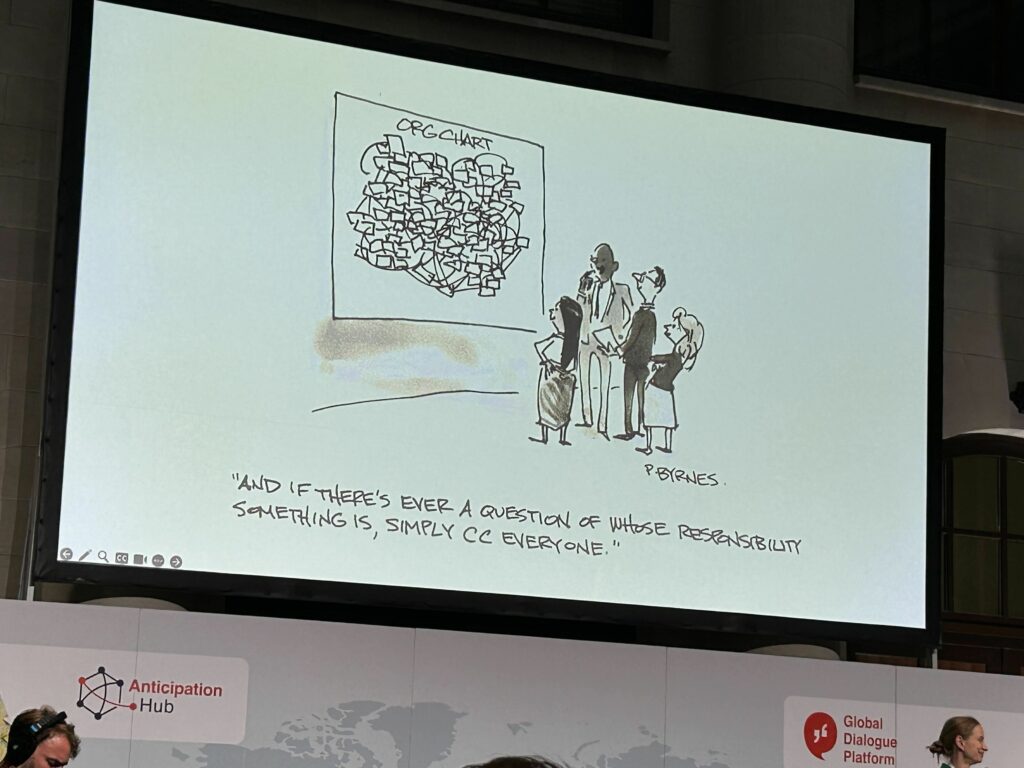
Day 1 wraps up with lightning talks, in which a CSO leader and an academic explore how El Niño is affecting lives, health, food security, violence and displacement of children and adolescents.

With:
- Wendy Emilia Vera García, Leader, Movimiento Por Ser Niña (‘Because I am a Girl’ movement)
- Liz Stephens, Science Lead / Professor of Climate Risks and Resilience, Red Cross Red Crescent Climate Centre and University of Reading
The parallel sessions are about to begin at #GlobalDP – come and join us online 👇🏾
🔗https://t.co/DjyTWDbiWF pic.twitter.com/GEYta9eyld
— Anticipation Hub (@AnticipationHub) October 10, 2023
Anticipatory action (AA) is a humanitarian term. We will use the Red Cross definition below:
“A set of actions taken to prevent or mitigate potential disaster impacts before a shock or before acute impacts are felt. The actions are carried out in anticipation of a hazard impact and based on a prediction of how the event will unfold. Anticipatory actions should not be a substitute for longer-term investment in risk reduction and should aim to strengthen people’s capacity to manage risks.”
World Disaster Report 2020, IFRC
The language of AA
The following are not synonymous with anticipatory action but are closely interconnected terms: early action, early warning, disaster risk reduction, future preparedness, disaster resilience, forecast-based action, forecast-based finance.
Nepal at the centre stage of the #GlobalDP with a powerful message from the CEO of @NDRRMA_Nepal:
"Nepal is keen to engage with the wider #AnticipatoryAction community to ensure we reach everyone with #EW4all and are able to save lives and reduce loss and damages" – Anil Pokhrel pic.twitter.com/CqP5hC0OLt— Danish Red Cross – Nepal (@DanRedCrossNP) October 10, 2023
Why is anticipatory action necessary?
- In the last 10 years… 410,000 people have been killed by extreme weather and climate-related events, most by heatwaves and storms. (World Disaster Report 2020)
- In the last 10 years… 83% of all disasters were caused by extreme weather and climate-related events
- There has been a 35% increase in climate and weather-related hazards since 1990
- The East Asia and Pacific region alone includes 13 of the 30 countries most vulnerable to the impacts of climate change, according to the World Bank. “Without concerted action, the region could see an additional 7.5 million people fall into poverty due to climate impacts by 2030,” warns the international financial institution.
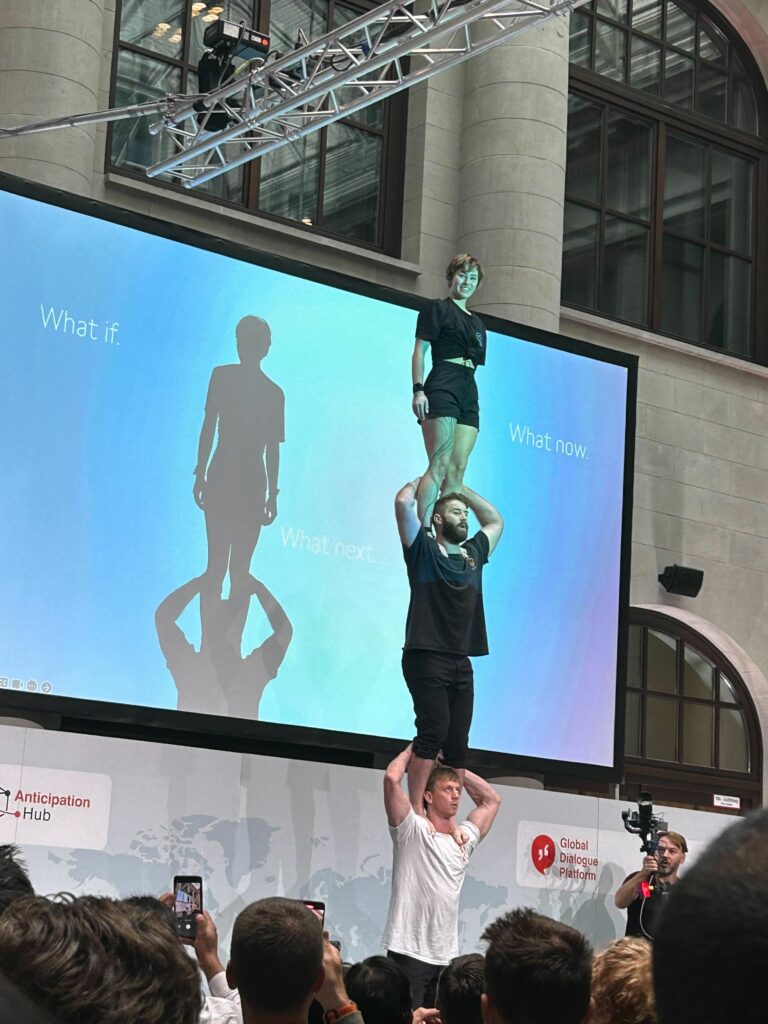
Anticipatory action networks
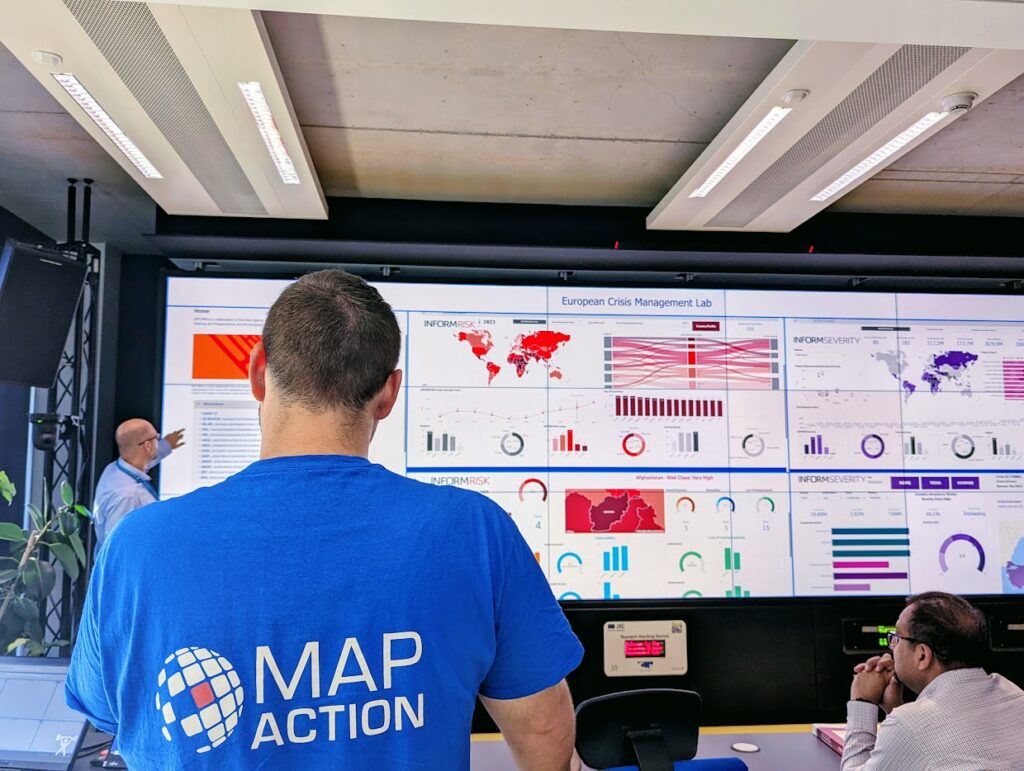
MapAction is part of the following anticipatory action frameworks and networks:
- INFORM: INFORM is a multi-stakeholder forum for developing shared, quantitative analysis relevant to humanitarian crises and disasters. INFORM includes organisations from across the multilateral system, including the humanitarian and development sector, donors, and technical partners. The Joint Research Center of European Commission is the scientific lead for INFORM. INFORM is developing a suite of quantitative, analytical products to support decision-making on humanitarian crises and disasters. These help make decisions at different stages of the disaster management cycle, specifically climate adaptation and disaster prevention, preparedness and response.
“The partnership between INFORM and MapAction greatly increases our capacity to support countries to develop INFORM Subnational risk models. These models help countries understand their risks and inform planning and programming to better prevent and prepare for crises and disasters.”
Andrew Thow, INFORM Programme Manager
- Start Network: Start Network is made up of more than 80 non-governmental organisations across five continents, ranging from large international organisations to local and national NGOs. Our programmes allow members to deliver humanitarian action around the world.
Reflections from our first #GlobalDP session this year on #AnticipatoryAction processes and timelines:
💬Involve communities from start to finish of the response.
🤝Risk assessments should be participatory.
💡Disaster Risk Reduction scientific communities should be engaged. pic.twitter.com/S6ko4zysho— Start Network (@StartNetwork) October 10, 2023
Anticipatory action allows communities exposed to hazards, as well as disaster managers, to be more prepared and forecast future hazards. It is a framework for disaster risk reduction and for triggering early release of funds to mitigate the effects of hazards.
These four phases are regularly used components within an anticipatory action plan.
- TRIGGERS: Defines when and where early action will be implemented.
- EARLY ACTIONS: Defines what early actions will be taken to reduce the impact
- FINANCING MECHANISM: a pre-agreed financing mechanism
- DELIVERY: Capacity to implement actions as planned
Triggers are essential to activating #AnticipatoryAction to save lives and livelihoods before hazards strike.
To learn more about creating a robust trigger mechanism, join @FAO, @UNOCHA, @climatesociety and more at this workshop.
Register 👉 https://t.co/dZ64Aj6l7b#GlobalDP pic.twitter.com/5PX88hAiXz
— FAO in Emergencies (@FAOemergencies) October 10, 2023
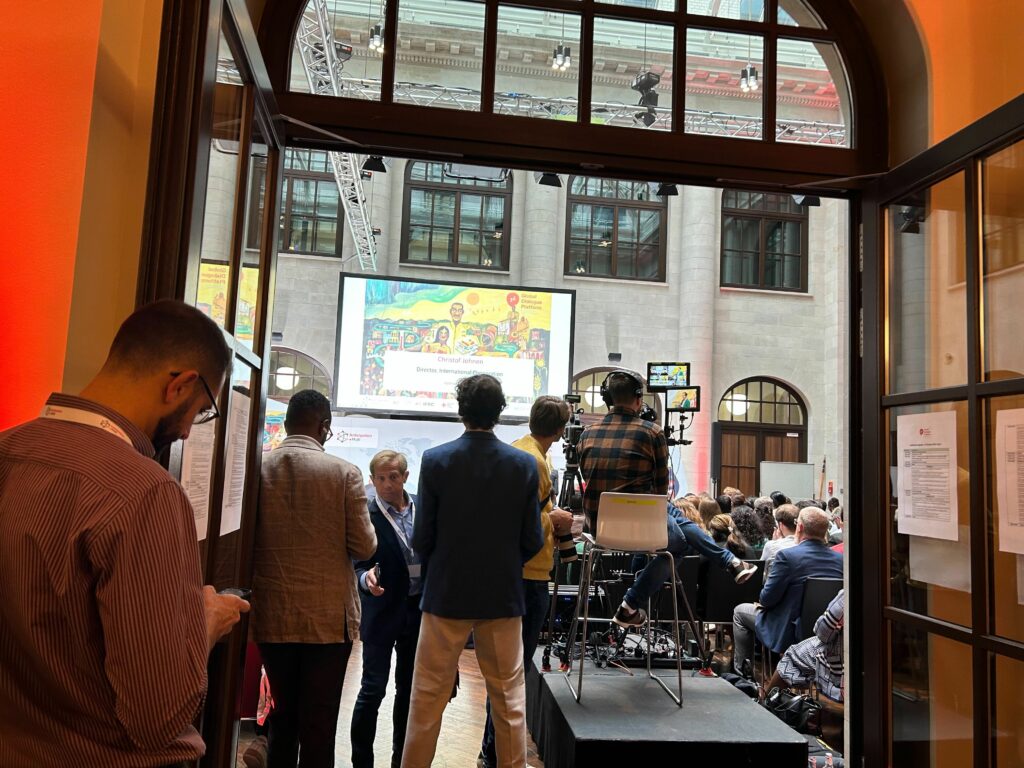
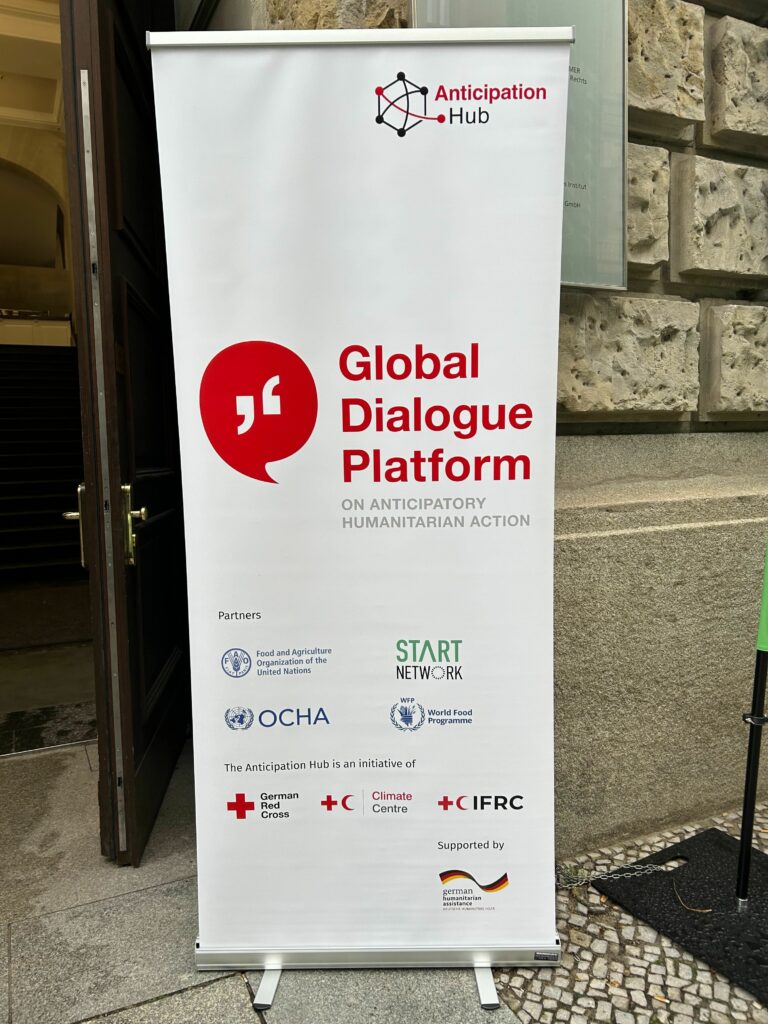
There are also three agreed parameters for anticipatory action:
What? The action is taken to reduce or prevent the crisis impact
When? The action is taken ahead of the hazard impact or before the impacts of the shock fully unfold (not to be confused with early response)
How? The decision to act is taken on a forecast or a collaborative analysis

